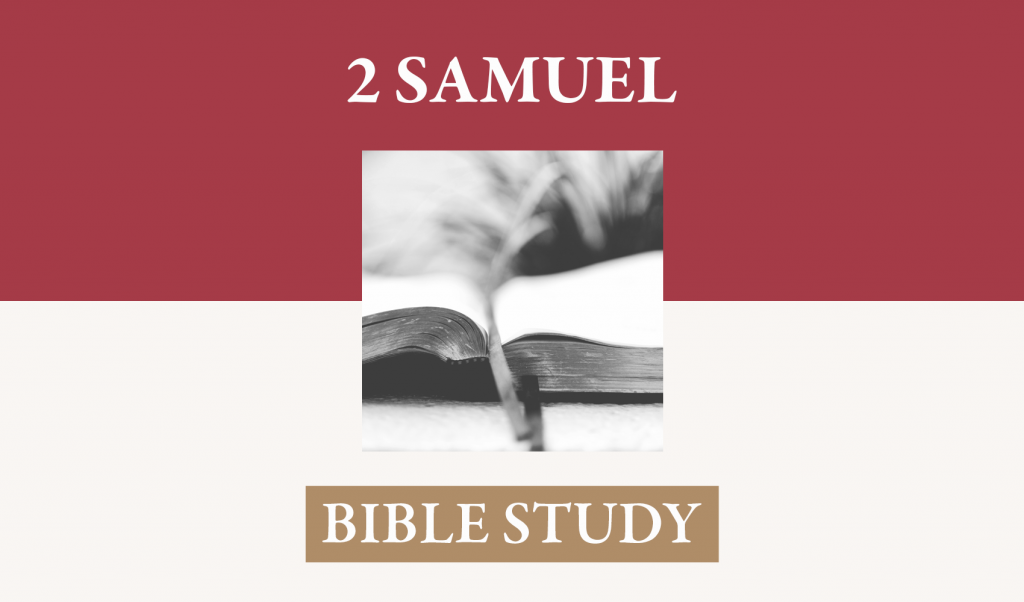We find in this narrative the complexities of both the providence and purpose of God as well as the weakness and strength of an overly-indulgent father who must submit patiently to the discipline of divine providence. The problems engaged here show the confusion engendered by David’s failure to take lawful action against a son who committed murder and the Lord’s enactment of a sanctifying trial while remaining faithful to his covenant with David.
I. The Return of Absalom (Chapter 14)
A. Joab’s Scheme
- Even though Absalom had murdered Amnon, David pined for Absalom. As king, he must retain his sense of the justice of this time of exile; as a father, he longed for some show of familial tenderness.
- Joab devised a way to get the king to justify his restoration of Absalom. He employed a woman of Tekoa to tell a story of fratricide within her own family.
- The woman presented herself as a widow who had two sons.
- Her sons, so her story was told, disputed in a field and one of them killed the other.
- Her family demanded the death of her surviving son.
- Such vengeance would leave her husband with “neither name nor remnant on the face of the earth.”
- With an obvious similarity to Cain and Abel with the assumption that God forbad vengeance to be taken on Cain (Genesis 4:15), and with her appeal that her house be seen as a city of refuge impermeable to the avenger of blood (Joshua 20), David rendered a verdict that “not one hair of your son shall fall to the ground.” There is not an exact parallel, for the murder of Amnon was purposeful, and the failure to bring justice on Absalom would indeed “pollute the land” (Numbers 35:33).
- She applies the story with an appeal for David to “Bring back his banished one” (13). This was not the first time that David had been led to make a judgment based on the story of another that really was aimed at him. One cannot help but think that David responded with favor to the story because it fit his propensities toward his son and because the narrative was filled with flattery toward him (17, 19, 20).
- David sees the purpose of this and discerns that Joab is behind it.
B. Joab received permission to bring Absalom back. When the king instructed Joab to bring back Absalom, Joab prostrated himself before the king. The entire event becomes more contorted in this, that the king is praised for sparing his son who, according to law, should have been executed, even by the king himself as the avenger of blood (Numbers 35:19). When he does bring back Absalom, however, he restricted him to his own house so that he could not see the face of the king.
C. Absalom’s perfection in physical appearance
- Absalom’s perfection of physical appearance put many in awe of him and gave a false appearance of an ability to lead and be a commander of men and an adjudicator of the law. How could someone of such perfection physically be incompetent in matters of the mind, the heart, and the spirit? Surely man looks on the outward appearance.
- Absalom felt that power of his appearance to others and knew that his attention toward them would be received with gratitude and loyalty. So vain he was that when he cut his hair once a year, he weighed it. That hair-vanity would cost him his life. In addition, he had three sons, and a daughter that he named Tamar, who is described as “a woman of beautiful appearance.”
- Absalom was so inveigled by his physical superiority, that he could not see the ugliness of his moral life or of his behavior. He felt justified in challenging the competence of his father to rule over Israel.
D. Absalom’s audacity. (verse 28-33)
- Rather than discern the gracious position he was in in having his life and a place in Jerusalem to live, Absalom felt resentment that he was not granted even more. He owed his restoration to Joab, but, instead of gratitude, harbored resentment toward him for not responding immediately to his request for an audience with him.
- As Samson avenged himself on the Philistines by burning their fields (Judges 15:5), so Absalom gained the attention of Joab by burning his field.
- He was not content with his life and with the mercy received, but now demanded attention as one entitled to special treatment. Having been removed from Geshur to Jerusalem, he still wanted more and felt that his restrictions were unjust. How parabolic of unrepentant man! guilty of crimes worthy of the eternal-death penalty, yet whining at the inconveniences of life in a fallen world.
- Absalom virtually dares anyone, even his father (whose anger was inflamed by the murder of Amnon) to find him guilty of anything worthy of such undignified treatment. He proposed to present to David the challenge of being the avenger of blood (“if there is iniquity in me, let him put me to death.”)
- Absalom feigned submission to David (verse 33) even while his every motion was designed to raise himself to the throne even if it meant the death of his father. Even as he spent years harboring hate and scheming for the murder of Amnon, so has he spent years nursing his pride, resenting his exile, and convincing himself that he deserved to supplant his father. He had a restless spirit to be in a position of prestige but never considered repentance nor meditated on things for which he should be grateful.
- This entire narrative records not one admirable trait of Absalom, and there we all would be were we left to our natural condition. God prevents our descent into despicableness by his common grace and at any time he gives us up (Romans 1:28), we descend rapidly. How great must sovereign saving grace be, both to forgive and to transform—to give a spirit of gratitude for deliverance and desire for holiness to fallen, sin-saturated creatures.
II. Absalom’s Usurpation
A. Absalom’s posture of importance (15:1-6). Absalom immediately put himself in a position of high visibility.
- He drove around in a chariot pulled by horses and had fifty men as an advance team of runners before him. This ostentation is at virtually infinite odds with the status that should be his as a murderer of his brother, a destroyer of Joab’s property, an insolent son to his father, and a deceiver of all men.
- He began to act as a judge in the gate. He showed personal interest in everyone who came to plead a case, gave them a positive statement of how he would rule were the prerogative his, and feigned a genuine affection for those of all the tribes of Israel.
- His system of judging violated every rule of wisdom in hearing both sides of a dispute and also the law in rendering judgment only on personal testimony without the presence of more than one witness. This shows of course, that he was only out to flatter and to gain adherence to himself and not to manifest any real propensity for insightful knowledge of the law or wisdom in the garnering of evidence.
B. Absalom’s religious veneer for revolutionary violence (15:7-12).
- In addition to his faux impression of aptitude in judgment, he feigned a religious intent in going to Hebron. He ostensibly went to offer sacrifice in accordance with a vow made while at Geshur.
- This supposed desire to fulfill a promise gained the approval of his father and thus an entourage of two hundred of the chief men of Jerusalem who were absolutely unaware of what Absalom’s real intent was went with him (verse 11).
- He had arranged for a signal to be given that would spread to all Israel, that he was being anointed as king in Hebron, the place from which David had reigned for seven years (verse 10).
- While he was offering his sacrifices, he boldly executed the treachery of inviting Ahithophel, a counselor of David to join him. For some reason, Ahithophel consented (Psalm 41:9; 1 Chronicles 27:33, 34).
III. David’s Retreat
A. He leaves the city. Two hundred of his most trusted and worthy men have gone and were isolated in Hebron at the time the coup began and large numbers in all the tribes appear to be turning toward Absalom.
- He was concerned that he himself would be killed by what could have been overwhelming odds against him in an attack on Jerusalem.
- He was concerned that his loyal servants would be killed, and so evacuated all of them.
- He was concerned that the people of Jerusalem would be put to the sword if a battle for possession of the city took place.
- His servants, perfectly loyal to David, expressed their complete acquiescence in his decision –“whatever my lord the king chooses.”
B. The Loyalty of the Gittites. These were proselytes to the God of Israel by way of David’s sojourn among the Philistines in 1 Samuel 28 and 29. They were men of Gath with whom David had had dealings of a very hostile nature from time to time. Goliath was of Gath. Obed-Edom whose home became the residence of the ark upon David’s failed attempt to bring it back was a Gittite. It seems that Ittai and some of his men had become admirers of David (he certainly was well known for his bravery among the Philistines – 1 Samuel 21:10, 11 and 29:5), had embraced the God of Israel, allied themselves with David and only recently had come to join in common cause with David. When David offered them the opportunity to stay in Jerusalem and be servants of Absalom, they steadfastly refused and chose to endure hardship with David and fight for his cause as the true king of Israel.
C. Strategic Presence of the Priests. The priests stationed themselves in a place to remind David and all the people of the covenants of promise symbolized in the ark. This part of the evacuation, seeing the ark carried fittingly by the priests and placed where all who passed over the brook Kidron could see it, focused their attention on the presence, power, and promises of the Lord God.
- David did not view its presence in a superstitious way but instructed the priests to return it to its appropriate place in the city. He clearly was reminded of the trauma involved in the attempts to return it to Jerusalem after its having been captured in battle (1 Samuel 4:10, 11). If God were not with him, the ark would do no good of itself.
- He was encouraged to trust the God of the covenant to do as seemed good to him; the covenant arose from the eternal wisdom of God and contained all provisions for the executing of his purpose to maximize the revelation of the divine glory and wisdom. David knew that God could bring him back or could say, “I have no delight in you.” But his heart was settled in affirming the goodness of God no matter how his temporal circumstances proceeded. “Let him do to me as seems good to him.” The ark reminded David that God had made “with me an everlasting covenant, ordered in all things and secure” (2 Samuel 23:5 referring to 7:8-17; read also David’s prayer in 1 Chronicles 29:10-13).
- The priests, set in their rightful place as those who tended the ark and the place of sacrifice, would be in Jerusalem and serve as a source of knowledge for David (verses 27-29). David trusted in the divine purpose and used means to accomplish what he believed were just ends.
D. He received sad news about Ahithophel as they ascended the mount of olives. He prayed that God would confound the counsel of Ahithophel, which God did indeed (17:23). This probably prompted the writing of Psalm 41 which includes verse 9: “Even my close friend in whom I trusted, who ate my bread, has lifted his heel against me.”
E. At some point David received assurance from the Lord, that he would be protected and restored. Psalm 41:11 says, “By this I know that you delight in me, my enemy will not shout in triumph over me.” On this occasion David composed a short Psalm, Psalm 3, in which he proclaimed, “But you O Lord, are a shield about me, my glory, and the lifter of my head. I cried aloud to the Lord, and he answered me from his holy hill. I lay down and slept: I woke again, for the Lord sustained me. I will not be afraid of many thousands of people who have set themselves against me all around” (verse 3-6).
F. Hushai the Archite – 1 Chronicles 27:33 records that “Hushai the Archite was the king’s friend.” Perhaps too feeble to survive in exile, David sent him back to Jerusalem, arriving just in time not to be detected as one who had followed David, to help interrupt the purpose of Absalom and provide strategic information for David. We see the spectacular results of Hushai’s ability to gain the confidence of Absalom in 17:1-14, where his counsel is preferred above that of Ahithophel. Probably it saved David’s life.
IV. Lies, Curses, Spies, and concubines (Chapter 16)
A. The Perverse lie of Ziba. Ziba brought donkeys and food to David in quest of both trust, gratitude, and an opportunity to gain a concession from David in this event of vulnerability. He lied about Mephobosheth in order to regain control of Saul’s estate for himself. It should be convicting to us to notice how frequently sinners act righteously to cloak their evil intent. With the mind we know what is good, while with the heart we are set on selfish and perverse outcomes.
B. The curses of Shimei. Shemei was a Benjaminite as yet unreconciled to the monarchy of David. As David left Jerusalem, he cursed David and threw dust and stones at his traveling party. David saw this as an element of divine providence which he should not resist but take as a time of justified humiliation. If even his son sought his life, why should he lash out at this Benjaminite and allow Abishai to cut off his head. He looked for the Lord to turn Shemei’s cursing into a blessing.
C. Hushai is able to approach Absalom immediately upon his entrance to Jerusalem. He is able to convince Absalom that Hushai’s loyalty was to the king of Israel, at that moment, therefore, to Absalom.
D. Ahithophel advises Absalom to mark out his territory like a stray dog, by lying with the ten concubines David left to care for the house during his retreat (16:20-23) fulfilling the divine judgment announced in 12:11, 12.
E. This straightforward narrative presents us with a great ethical dilemma. We find even those on the side of righteousness using deceit and lies to gain advantage over the enemy (15:34; 16:18, 19; 17:20). Jesus, however, came to bear witness to the truth and made his way through his ministry and all the way to Calvary by means of the truth (John 14:6; 18:37, 38; Ephesians 4:25; 1 John 2:26, 27; 5:20, 21).
















